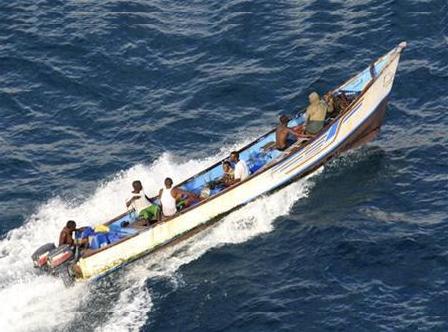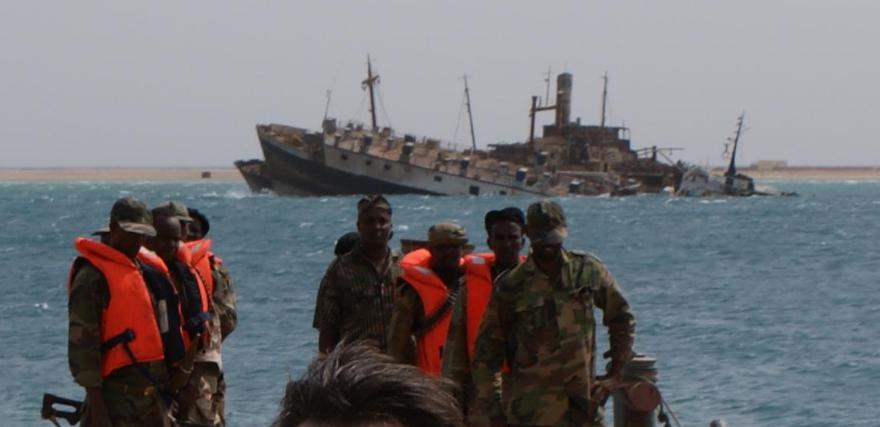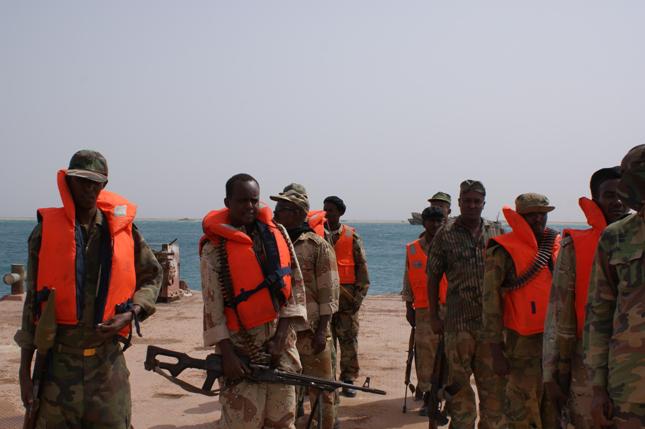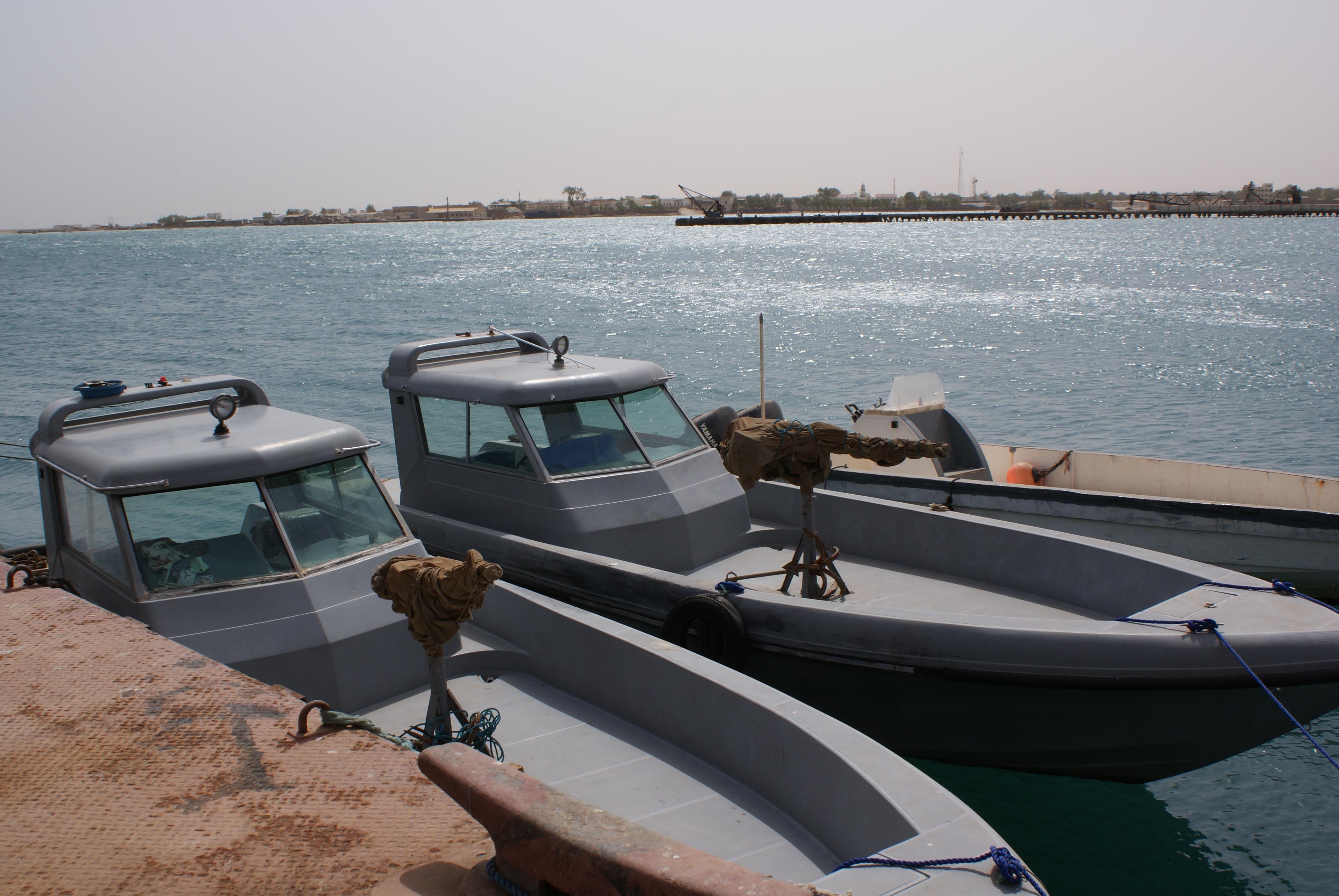Skulls and Crossroads
Skulls and Crossroads

As the 20ft Skiffs raced towards the Panamanian flagged Bulker, the occupants, dressed in a ragged mix of clothing, combat trousers, t-shirts, some with flip-flops, some with odd trainers, all armed, readied their AK 47’s and one for the men fixed a belt of heavy ammunition to the large machine gun he carried.
[emember_protected]
The bulker showed no signs of awareness or concern that the men were approaching and the men in the skiff constantly watched for movement or crew on deck and the bridge wings.
[/emember_protected]
As the skiff approached the bulker, and moved down the flank of the vessel, the crew came to the railings and watched the men, their presence a familiar sight in the Gulf of Aden yet, unlike other skiffs the crew had seen on their regular transits through these waters, and to the crews relief and frequent reassurance, these skiffs were not an attack from pirates, rather the bulkers security escort into the port of Berbera by the Somaliland coastguard, the maritime police force from the breakaway republic in the north west corner of Somalia.
Different Recent History
Somaliland has always maintained its difference and distance from the rest of Somalia, from the colonial period of the British protectorate, brief independence in 1960 and when the attempt to unite with the rest of Somalia failed; during the bloody and destructive civil war, resulting in their withdrawal and the re-establishing of their independence in 1991.
Declaring themselves the independent Republic of Somaliland; a status that despite the total lack of international or UN recognition, has resulted in Somaliland’s 19 years of self governance, independent democratically elected leaders, their own constitution, currency and passport system. In a country that has received little or no International aid or relief support, the ability to protect your borders is essential; when you have 860 Kms of Gulf of Aden coastline, containing ruthless pirates from the neighbouring country – it’s critical.
The Coast Guard
The Somaliland coastguard was established in the first few years of the new millennium from the maritime wing of the Somaliland police service following a rise in smuggling, trafficking and piracy. Its command structure was built on Somaliland veterans of the Somali Navy. Based in the economically strategic port town of Berbera, with their coastline split into three sectors and a total of 14 Coast Guard stations located along the length of the coastline, which are manned by just under 400 Coast Guard personnel.
They are currently the only functioning and active coastguard in Somalia, despite attempts by the neighbouring state of Puntland to raise their own much needed service and the collective state governments (Somaliland, Puntland, Galmudug) and the Transitional Federal Government in Mogadishu continuing to request funding from the International Community.
Indeed, the requirement for effective measures to counter the piracy in Somalia has put Somaliland and the other Somali States at somewhat of a crossroads; having met the International Community’s requirement for joint cooperation and support for the recent UNPOS Kampala Process the progress for their development has now started to gain momentum and the relevant funding to enable the development of programmes relating to Judicial, Prisons and other linked programmes has now started. is, of course, is excellent news for Somaliland as indeed it is for the other Somali States, and places the Somaliland Coastguard in an excellent position to work with, assist and mentor the other Somali States to a high standard of training and operational effectiveness. Their current training and operational development programme, has been designed and is being implemented by Triton International Ltd, as part of their partnership contract to Train and Operationally Mentor the coastguard, improve their capability and develop their ongoing operational commitment to anti-piracy and waterborne patrolling and response, which has resulted in more than 120 pirates being captured, prosecuted and jailed in 2010 alone. The funding for the development of Somalia’s Coastal Monitoring capability will be initially limited to Land based development, due to the concern by the International Community that any vessels provided to the Somali Coastguards (including Somaliland) could be used by Pirates for their own operations. Given the current situation with Piracy in both Puntland (Eyl) and Galmudug (Hobyo & Harardhere) this may not be an unreasonable concern, however Somaliland has no indigenous Piracy, does not have suspicions of Piracy/Government links and has a proven waterborne patrolling requirement for both Coastal Defence and the protection of the Port of Berbera.

- A tough job to do

- Preparing to deploy
Unique Position and Role
The unique situation with Somaliland derives from their 19 years of separation from the rest of Somalia, their previous colonial links to Britain (as opposed to the Colonial Italian influence in Somalia) and the independent development of their own economy and constitution. This has resulted in their commitment to Coastal Security and a very active Anti-Piracy policy, with the Coastguard as the practical enforcers; indeed the recent incidents of the Coastguard interdiction of Pirates as they either transit through Somaliland Territorial Waters to conduct attacks or as they are returning towards Puntland waters, has led to exchanges of fire and the denial of access to Pirates intent on using Somaliland Coastal towns in the disputed region of Saanag to hold captured Vessels, whilst negotiating ransom payment.
Port of Berbera
The Coastguard’s main Headquarters are located in Berbera, next to the Ministry of Finance & Customs building, adjacent to the Port complex and the hub of the shipping trade in Somaliland. The Port is both ISPS Code Compliant and maintains a strong working relationship with the Coastguard and their partners Triton. The Port’s primary business is Livestock import and export, with Container, wet and dry cargo and general white goods movement, for Somaliland and Ethiopia, ensuring the Port never rests.
The World Food programme has now started to deliver Aid through Berbera for Ethiopia, Somaliland, Puntland and Central Somalia. This has helped to maintain the flow of aid to the region and takes significant pressure off Djibouti, as the main point of delivery. Currently, the delivery of WFP Food Aid to Puntland has been marred by the recent kidnapping of five truck drivers of delivery convoys, by Puntland Pirates and the theft of the Aid Cargo. Negotiations with the Pirates by Local Elders and the Families have so far yielded little success in securing their release.
Capability Development
In order to maintain their capability, the Coastguard operates a number of small fast patrol boats, which have Deck Mounted Vladimirov KPV Heavy Machine Guns, which fire 14.5x114mm BZT – Armour-piercing incendiary tracer full metal jacket round with a steel core. These are used for inshore and coastal patrols and the pursuit of Pirates. The maintenance of discipline and operational training is a key component to the coastguards effectiveness and the development of a 12 week basic training course, with further specialised training modules for communications, medical, maritime law, observation & monitoring, tactical maritime operations, vessel maintenance and leadership, will ensure this continues.

- Patrol boats with Deck Mounted Vladimirov KPV Heavy Machine Guns
The Future
Full implementation of these courses remains dependent on the availability of funding to develop the coastguard capability. Given the increasing concern of the current land based Somali terrorists (Al Shabaab; Hizbol Islam and elements of Al Qaeda) utilising the maritime domain for resupply, manning and attacks, increased impetus is required to ensure the coastguard can be trained and equipped to counter such an increasing threat, in addition to the range of piracy, smuggling and illegal activities it currently combats.
At a time where millions of dollars are spent daily on maintaining an international naval presence in the Gulf of Aden and the Indian Ocean and the international community seek solutions for the support and engagement of legittimate Somali governance, Somaliland continues to remain isolated and unrecognised in its status or the legittimate contribution it continues to make towards the reduction of piracy and the prevention of maritime terrorism. Less than three naval vessels have visited the port of Berbera and despite frequent liaison and cooperation attempts, no Somaliland Coastguard is working aboard any naval vessel as a liaison, or linguist/interpreter. Nor are the Coastguard Law Enforcement Officers used to assistance with the arrest and communication with Pirates, the preservation of evidence, statement collation or intelligence recovery/collation.
All these requirements can be provided by a trained Somaliland Coastguard. The partnership with Triton has generated a definitive Training Development and Operational Mentoring programme, which, if supported, can not only improve the coastguard, but is strategically placed to significantly contribute towards the instigation of a Somali-wide Coastal Monitoring Force that could be a key asset in the reduction and possibly, removal of Piracy from the waters around Somalia.
Article by Simon Jones, C.E.O. of Triton International


am really disappointed…i thought marsec had a lot more to offer then a blog about a guided tour from this so called “somaliland” which in fact is a just ONE CLAN PROJECT,what you are referring to a “coast gourd ” they have no boats…they are using captured fish boats from non isaak clan minorities who are dependent on fish for there livelihood ,and its not just what you are referring to a “coast gourd ” who is non existence even the so called army is just clan militia from the isaak clans of course and they have no training whatsoever… as we speak there is bloody clan war going on between the isaak leader silanyo s own sub clan and the Large Darod Clans of Sanaag sool and cayn aka SSC in buhodle town you can see who the SSC are here http://www.youtube.com/watch?v=wjQ272sisIY and here http://tiny.cc/4o4zz if i come back to the subject which is piracy somalis share everything and they intermarry each other,have the same language,religion and race ,you cant tell who is who unless they themselves tell you so…the only reason why you dont see now a lots of piracy in the gulf of aden is because the golf of aden is under the hands of Atlantis now…. that was not the case before the Atlantis was launched as you can see it here http://tiny.cc/6ikll here http://tiny.cc/7ij1o and here http://tiny.cc/cwl3l the only reason why you dont see more piracy attack on that area is because the gulf of aden is narrower then the large vast Indian ocean and the gulf of aden NOW is 100% in the hands of the Atlantis http://tiny.cc/96zpx and isaak clan who are de facto the ones who call themselves a “somaliland” are deeply involved of whats going in puntland and galmudug but NOT only that even deep south they are the ones who running the al shabab bothe Nr One and One two Bosses of Al Shabab are from the isaak clan aka “somaliland” even before al shabab the isaaks created al itahad which the leader of that group sheik warsame who fought agains ethiopia and puntland state and who are responsiple for terrorism attacks in ethiopia and somalia belongs the same sub clan of the current leader of “somaliland ” and is living free in burco somaliland the same town that the current isaak leader silanyo hails from and al shabab also run by another isaak man by the name of Ahmed Abdi Godane …and its well known that even the most secular isaaks support the al shabab because they see at opportunity that will enhance there agenda which is the creation of there own ONE CLAN STATE aka “somaliland” and finally here is facts that you will never see on the so called “somaliland media sites” which in fact are just personal blogs with clan agenda which is the creation of ISAAKLAND aka “somaliland” take a look t This document and see if you find in the so called “somaliland media sites” http://tiny.cc/q9x46
I hope the investment and the training is worth it. It is not unlikely that the pirates benefit from the courses and the improvement of the infrastructure too. (see Port of Berbera section)
I see that only as an associated measure because until the reasons for the piracy (poorness and hopeless and seeing how simple money can be earned with piracy) will not be solved.
Jubaland – It is both disappointing and unfortunately all too expected to see this type of response, which has neither bearing nor relevance to the article. The status and current situation with the Clans and Sub-Clans in both Somaliland and the rest of Somalia is one of the reasons why the country has so many problems. The article is about an initial and expandable platform for good. A platform that will meet not only the security and Piracy prevention requirements of the local and international communities, but with the development of a common operating capability, similar methodology and Joint liaison, the Coastguard capability that has been founded in Somaliland can be reciprocated in Puntland, Galmudug and down to Mogadishu (and eventually beyond)to prevent the escalation of Piracy, which in turn meets the critical point that Jens stated, which is one of alternative choices to the Poor and hopeless communities along the Coastline – If a strong Coastguard can reduce Piracy, it can also encourage and establish an environment where Domestic and Artesian Fishing and other maritime trade and industries can be developed due to the Coastguards establishment of a safe and secure “Risk Reduced” environment that NGO’s, Charities and UN entities can safely invest their funds into the population and humanitarian projects.
The progress for stability and peace building in Somalia is not dependant on Clan or Sub-Clan, it’s for the whole country and the divisions you speak about will continue to split and divide the country as long as these attitudes continue. Piracy is a common problem that can be utilised to enable common cooperation and progress – A word that for a long time has not been used to describe Somalia! The ball as they say, is well and truly in Somalia’s Court!